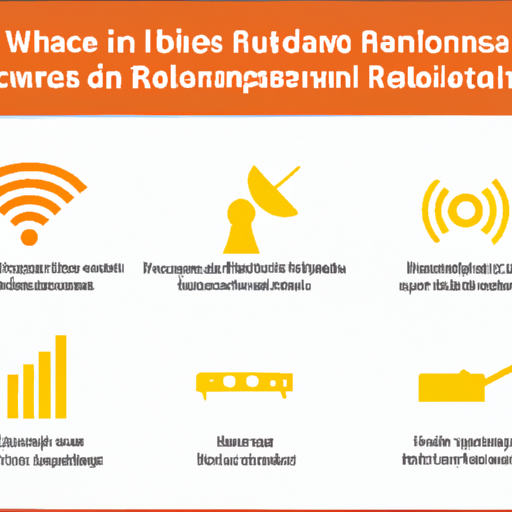

The wireless radio frequency recognition scenario encompasses a wide range of industries and applications. From retail and logistics to healthcare and manufacturing, this technology has revolutionized various sectors by providing efficient and accurate identification and tracking capabilities. In this article, we will explore some of the key industries that have adopted wireless radio frequency recognition and delve into the benefits and challenges associated with its implementation.

2. Logistics and Transportation: In the logistics and transportation sector, wireless radio frequency recognition plays a crucial role in streamlining operations and improving efficiency. RFID tags are attached to packages, pallets, or containers, allowing real-time tracking and tracing throughout the supply chain. This technology enables logistics companies to optimize routes, minimize delivery delays, and enhance overall supply chain visibility. Furthermore, it helps prevent theft and loss of goods by providing accurate and reliable information about the location and condition of shipments.
3. Healthcare: Wireless radio frequency recognition has transformed the healthcare industry by improving patient safety, inventory management, and asset tracking. RFID tags are used to identify and track medical equipment, medication, and patient records. This technology enables healthcare providers to locate and manage critical assets efficiently, reducing costs associated with lost or misplaced items. Moreover, RFID-enabled patient wristbands enhance patient safety by ensuring accurate medication administration and preventing medical errors.
4. Manufacturing and Industrial Automation: In the manufacturing sector, wireless radio frequency recognition is widely used for inventory management, quality control, and process automation. RFID tags are attached to raw materials, work-in-progress items, and finished goods, enabling real-time tracking and monitoring. This technology helps manufacturers optimize production processes, reduce errors, and improve overall operational efficiency. Additionally, RFID-enabled tools and equipment tracking systems enhance worker safety and prevent loss or theft of valuable assets.
5. Agriculture and Livestock Management: Wireless radio frequency recognition has found applications in the agriculture industry, particularly in livestock management and crop monitoring. RFID tags are used to identify and track individual animals, enabling farmers to monitor their health, location, and movement patterns. This technology helps prevent theft, improve breeding programs, and enhance overall farm management. In crop monitoring, RFID tags can be attached to plants or soil sensors to collect data on growth conditions, enabling farmers to optimize irrigation and fertilization processes.
While wireless radio frequency recognition offers numerous benefits, there are also challenges associated with its implementation. These include the initial cost of infrastructure setup, tag readability limitations, and privacy concerns. However, advancements in technology and decreasing costs are making RFID more accessible to a wider range of industries.
In conclusion, the wireless radio frequency recognition scenario encompasses a diverse range of industries, each benefiting from its unique applications. From retail and logistics to healthcare and manufacturing, this technology has revolutionized various sectors by providing efficient and accurate identification and tracking capabilities. As the technology continues to evolve, we can expect further advancements and wider adoption across industries, leading to increased efficiency, improved customer experiences, and enhanced overall productivity.
The wireless radio frequency recognition scenario encompasses a wide range of industries and applications. From retail and logistics to healthcare and manufacturing, this technology has revolutionized various sectors by providing efficient and accurate identification and tracking capabilities. In this article, we will explore some of the key industries that have adopted wireless radio frequency recognition and delve into the benefits and challenges associated with its implementation.

2. Logistics and Transportation: In the logistics and transportation sector, wireless radio frequency recognition plays a crucial role in streamlining operations and improving efficiency. RFID tags are attached to packages, pallets, or containers, allowing real-time tracking and tracing throughout the supply chain. This technology enables logistics companies to optimize routes, minimize delivery delays, and enhance overall supply chain visibility. Furthermore, it helps prevent theft and loss of goods by providing accurate and reliable information about the location and condition of shipments.
3. Healthcare: Wireless radio frequency recognition has transformed the healthcare industry by improving patient safety, inventory management, and asset tracking. RFID tags are used to identify and track medical equipment, medication, and patient records. This technology enables healthcare providers to locate and manage critical assets efficiently, reducing costs associated with lost or misplaced items. Moreover, RFID-enabled patient wristbands enhance patient safety by ensuring accurate medication administration and preventing medical errors.
4. Manufacturing and Industrial Automation: In the manufacturing sector, wireless radio frequency recognition is widely used for inventory management, quality control, and process automation. RFID tags are attached to raw materials, work-in-progress items, and finished goods, enabling real-time tracking and monitoring. This technology helps manufacturers optimize production processes, reduce errors, and improve overall operational efficiency. Additionally, RFID-enabled tools and equipment tracking systems enhance worker safety and prevent loss or theft of valuable assets.
5. Agriculture and Livestock Management: Wireless radio frequency recognition has found applications in the agriculture industry, particularly in livestock management and crop monitoring. RFID tags are used to identify and track individual animals, enabling farmers to monitor their health, location, and movement patterns. This technology helps prevent theft, improve breeding programs, and enhance overall farm management. In crop monitoring, RFID tags can be attached to plants or soil sensors to collect data on growth conditions, enabling farmers to optimize irrigation and fertilization processes.
While wireless radio frequency recognition offers numerous benefits, there are also challenges associated with its implementation. These include the initial cost of infrastructure setup, tag readability limitations, and privacy concerns. However, advancements in technology and decreasing costs are making RFID more accessible to a wider range of industries.
In conclusion, the wireless radio frequency recognition scenario encompasses a diverse range of industries, each benefiting from its unique applications. From retail and logistics to healthcare and manufacturing, this technology has revolutionized various sectors by providing efficient and accurate identification and tracking capabilities. As the technology continues to evolve, we can expect further advancements and wider adoption across industries, leading to increased efficiency, improved customer experiences, and enhanced overall productivity.